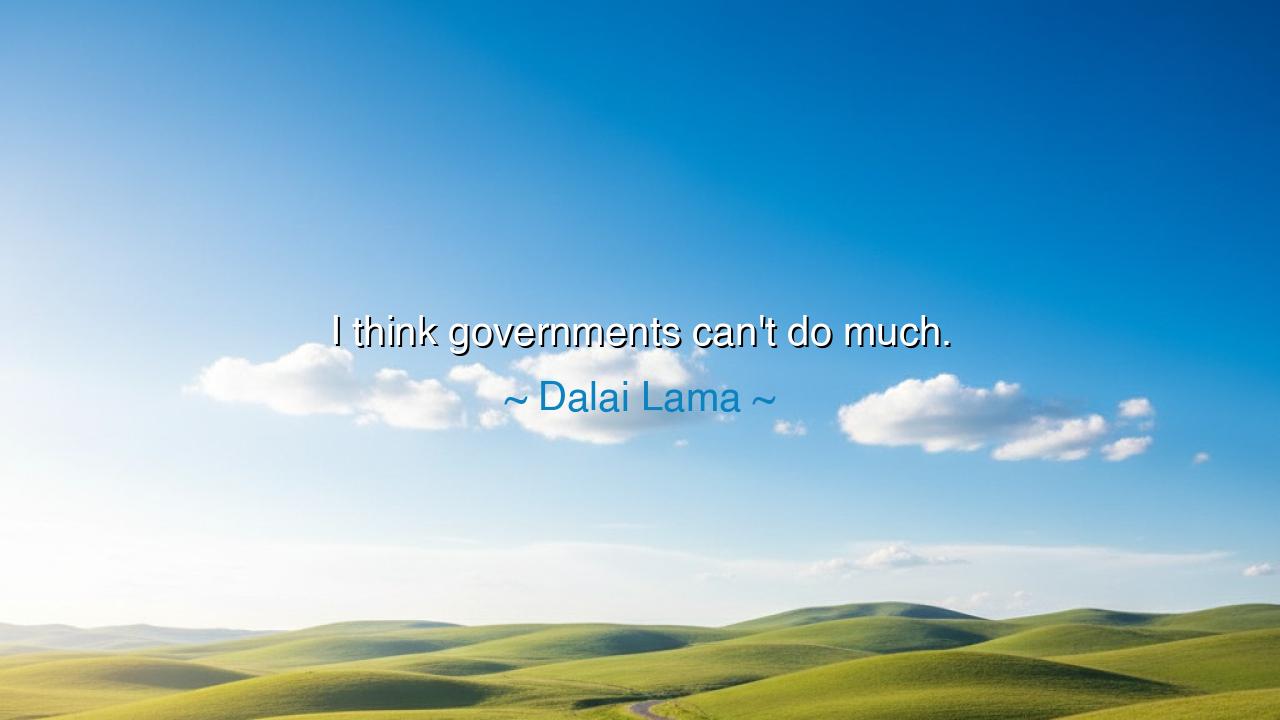
I think governments can't do much.






"I think governments can't do much." Thus spoke His Holiness the Dalai Lama, the gentle sage of Tibet, whose laughter carries more truth than the proclamations of kings. At first, his words may seem simple, even humble — yet beneath them lies the deep wisdom of one who has watched empires rise and fall, who has seen laws written and erased, and who knows that the heart of humanity lies not in the power of governments, but in the compassion of individual souls. His statement is not one of despair, but of liberation: a reminder that the true transformation of the world does not begin in palaces or parliaments, but within the quiet courage of the human spirit.
To understand his words, one must first understand the life from which they sprang. The Dalai Lama, born into the serenity of the Tibetan highlands, was thrust by fate into the storms of politics when his nation was overtaken by foreign power. He became not only a spiritual teacher but the head of a government in exile, a leader without a land, striving to preserve his people's faith and dignity. Through decades of exile, he came to see that political power, even at its strongest, is bound by limitation. Governments can pass laws, raise armies, and shape economies, but they cannot command the human heart. They can build structures of order, yet they cannot create the inner peace that gives life meaning. It is this understanding — born of suffering and reflection — that led him to say, with compassion and humility, “I think governments can’t do much.”
The meaning of his words is not that governments are useless, but that their power is superficial compared to the deeper work of moral awakening. Governments can restrain evil, but they cannot inspire goodness. They can legislate equality, but they cannot make men love one another. The Dalai Lama reminds us that all true progress — whether in peace, justice, or happiness — must begin from within the hearts of individuals. A government may guide or support, but it cannot substitute for the will and wisdom of the people. For when the people lack compassion, even the finest laws turn to dust; but when the people live with virtue, even flawed systems can yield harmony.
History bears witness to this truth. Consider Mahatma Gandhi, who faced the mighty British Empire not with weapons or armies, but with the strength of conscience. The Indian government, under colonial rule, had all the instruments of control — yet it was powerless before the unity and moral force of millions who refused to obey injustice. When Gandhi said, “Be the change you wish to see in the world,” he echoed the same spirit that lives in the Dalai Lama’s words: that governments cannot save humanity — only humanity can save itself. The revolutions that endure are not those written in law, but those written in the human heart.
The Dalai Lama’s insight also speaks to our modern age, when people often look to governments to solve every ill — poverty, loneliness, anger, and inequality. Yet he reminds us that no law can heal a wounded spirit, no policy can teach forgiveness, and no bureaucracy can create joy. These are the works of the soul. The Dalai Lama teaches that peace begins not with nations signing treaties, but with neighbors greeting one another in kindness; not with officials debating policies, but with ordinary people choosing understanding over hate. A peaceful world must first be made of peaceful minds. Governments may maintain order, but only compassion can sustain harmony.
And yet, his words carry no bitterness toward government. Rather, they invite humility. For government is but a reflection of the people it serves — a mirror of their values, fears, and hopes. When citizens are selfish, government becomes corrupt; when citizens are divided, government becomes powerless. But when citizens act with integrity and love, their governments follow. The Dalai Lama’s wisdom is not a rejection of leadership, but a call to self-leadership — to rule one’s own heart with the same justice and mercy we expect of nations.
The lesson, therefore, is as gentle as it is profound: do not place the burden of the world upon governments alone. Do not wait for leaders to create the peace you can create yourself. The greatest revolutions begin in silence — in acts of kindness, forgiveness, and courage. Each person is a government of the soul, ruling the small kingdom of their own heart. Govern it wisely, and you govern the world in miniature. Seek not to control others, but to master yourself. For when millions of hearts are rightly ruled, no government, however small its power, will fail to serve humanity.
So remember the timeless wisdom of the Dalai Lama, whose laughter hides a deeper truth: that governments, though necessary, are but the shadows of human spirit. “Governments can’t do much,” he says — and in those words is the key to real power. The world will not be saved by decrees or elections, but by compassion, courage, and the quiet work of souls who refuse to surrender hope. Be among them. Govern yourself with wisdom, and you shall need no ruler; love your neighbor, and you shall need no law. For when humanity learns to lead itself through the heart, then even the smallest government will be enough — and peace will at last have a home.






AAdministratorAdministrator
Welcome, honored guests. Please leave a comment, we will respond soon